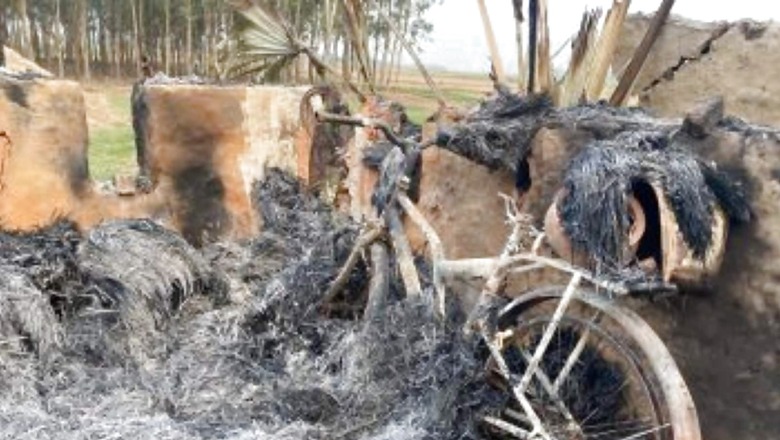
views
Media reports suggest two factions of the same party settled scores against each other. The deputy chief of a panchayat was killed on Monday evening. Within hours, eight people – including women and children – from the families of the foot soldiers of the opposite camp were charred to death. The police station was not far. But no one stopped the carnage.
If you think this is the beginning and end of a crime, you are mistaken. Violence and rivalry are neither new nor specific to any party or state. But West Bengal is unique in creating a social, political and economic ecosystem based on crime and corruption.
Like a debt trap, the state has entered a phase of perpetual violence, which will end with either destruction or forceful imposition of law and order, ignoring collateral or political damages. The steady decline in economic fortune and cultural equity of the state for five decades is inversely proportional to the strengthening of this ecosystem.
ALSO READ | Birbhum Violence: Youth Will Leave, ‘Bhadralok’ Will Disappear as West Bengal Witnesses a Bloody Decline
The relationship is complex. To get a feel of it, let us deconstruct the sequence of events of the Birbhum massacre.
The area is dominated by Muslims, all more or less aligned to the Trinamool Congress. Before 2011, they were divided between the Congress and the CPI(M). The prime accused (of the mass murder), block president of the ruling party, was at large for over two days till the chief minister ordered his arrest on Thursday afternoon. Within hours, he was nabbed from a nearby location.
There is no official clue to the rivalry. The deceased deputy chief, Bhadu Sheikh, was once a driver and the prime accused Anarul Hussain was a mason. Both amassed huge wealth over the last decade or so. Overnight, their modest village homes were replaced by palatial houses. Both wielded huge power. Bhadu used to roam around with a dozen bodyguards.
There is no official clue to their prosperity either. Birbhum is a backward district – a prime source of cheap migratory labour in the country – in an economically laggard state.
Media reports suggest they were local kingpins of a racket collecting extortion tax from trucks, mostly laden with sand and stone chips sourced from quarries in Birbhum and neighbouring state Jharkhand.
The question is: Will the racket cease to exist with Bhadu and Anarul? The answer is a strict ‘No’. They will be replaced by some others. There may not be another massacre for some time, but muscle power will rule the roost and crime will continue unabated in some form or the other.
The clue to this conjecture lies in the puzzling inaction of police on that fateful night. Didn’t the police know that the next morning they might face the flak? Or did they have extra faith in the ability of their bosses to manage the crisis?
Why was there no media report of the carnage for roughly 12 hours? Why did the all-powerful district president of the party blame the fire on a silly accident (‘bursting of a TV set’) on Tuesday morning? Questions abound and silence is the only answer.
The Birbhum massacre will be forgotten soon. But crime will not stop. Over the last week or so nearly two dozen people have been killed in the state. Bullets did fly in Kolkata. On Thursday, local newspapers reported the rape of a tribal woman in South 24-Parganas district before her children.
Violence has been an integral part of West Bengal. The state witnessed the gravest of grave crimes, including mass murders, over the decades. All were normalised, trivialised, forgotten. Great minds in and outside West Bengal worked overtime to brush many atrocities under the carpet. There is limited proof of the Marichjhapi or Bijon Setu (Kolkata) massacres.
Bengali literature has plenty of references to the state domination of Naxalite ‘revolution’ in the 1960s and early 1970s. Rarely a reader will come across condemnation of the severe violation of human rights by the Naxalites and the long-term harm it did to the Bengali society. Siddhartha Shankar Ray saved the state by suppressing it. He was made a political villain.
The latest carnage at Birbhum is just a drop in that ocean. The only problem is: the violence that was once ideologised to bring peace and equality, has now become a mainstay of society and its politics.
Ask any transporter, every truck pays a hefty extortion tax for both inter-state and intra-state movement in West Bengal. The rate varies from Rs 2000 to Rs 7000 per truck. Even movement of essentials comes at a cost.
The relationship between money and politics is old and global. All political parties collect their pound of flesh from the business to run the establishment. The bigger the party, the more is the collection.
In a thriving state, these collections are done in bulk. As the share of large businesses receded and the state became more and more isolated from the national economy, politics in West Bengal became increasingly dependent on retail collections.
Such an ecosystem needs huge manpower and that ensures wider social recognition. That also explains why the great Bengali intellectualism, which is critical about everything under the sun, goes on silent mode about atrocities at home, under their noses.
Since political power is crucial for the survival of the ecosystem, everyone willy-nilly sides with the ruling party. This explains the great resistance or hesitancy of the electorate in West Bengal to change. As politics became increasingly transactional and elections became an existential issue and violence became normal.
In the past, such violence used to take place between supporters of opposing parties. As the hegemony of the ruling party grew, inner-party struggles became more commonplace.
Conflicts between factions of the ruling Trinamool rocked the entire state in the run-up to the recently concluded municipal election. How the inner-party conflicts spill over in the post-poll scenario can be a subject of deep research.
The sorry fact is: such ills have become a mainstay of the political economy of West Bengal. Only a forceful intervention can stop it. But considering the political risks involved, that’s a tall expectation.
Pratim Ranjan Bose is a Columnist, Researcher and Political Analyst. He tweets at @PratimBose. The views expressed in this article are those of the author and do not represent the stand of this publication.
Read all the Latest Opinion News and Breaking News here



















Comments
0 comment